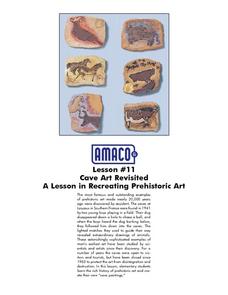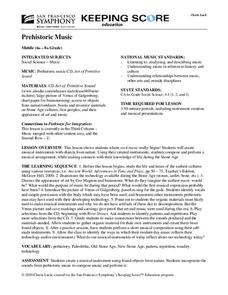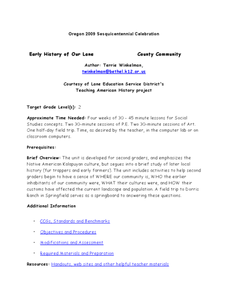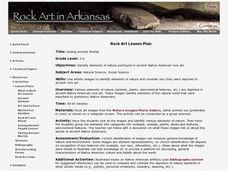Curated OER
Lascaux Cave Art on Ceramic Stones
Here is a great way to incorporate art into your next unit on prehistoric people. The class makes stones out of ceramic clay and then creates paintings like those found in the Lascaux Caves in France. A video link, full day-by-day...
Curated OER
Cave Art Revisited
Students research the sources of prehistoric cave paintings and engage in an activity of creating their own cave art. The lesson focuses on the design, composition style of the art, and importance of cultural contributions cave painting...
San Francisco Symphony
Prehistoric Music
What was music like during the Stone Age? Learners listen to a CD entitled, Art of Primitive Sound as they consider the culture of people in the Stone Age. They use objects found in nature to create instruments, and then...
Curated OER
Art and Culture
Students compare and contrast the ways in which human figures are portrayed in rock art made by ancient Native American artists and in the drawings and paintings of historic European and American artists. They use images to identify...
Curated OER
Agriculture Shapes Kentucky History
Students explore the lives of early American Indians and settlers in Kentucky. They describe the agricultural practices of Indians native to Kentucky and develop a supply list for a group of settlers coming to the state to establish...
Curated OER
Cave Paintings: Studying the Past
Students are introduced to prehistoric paintings with the cave art at Lascaux and Altamira. They, in groups, role-play the members of a clan and design appropriate cave paintings for their group.
Curated OER
To Tell The Truth
Learners play "To Tell The Truth" Art History style in this fun and interactive game for the upper-elementary Art classroom. Included in the lesson is a detailed set of rules and suggestions for successful classroom implementation.
Curated OER
Cave Art: Discovering Prehistoric Humans through Pictures
Students explore how people in earlier times used art as a way to record stories and communicate ideas by studying paintings from the Cave of Lascaux and other caves in France. Three lessons on one page.
Curated OER
Cave Paintings
Students examine various types of prehistoric art. In groups, they research the purpose of the drawings and use the internet to research the various ancient human groups. To end the lesson, they draw animals compared to the prehistoric...
Curated OER
Cave Art: Discovering Prehistoric Humans through Pictures
Students explore how people in earlier times used art as a way to record stories and communicate ideas. By studying paintings from the Cave of Lascaux and other caves in France, students discover that pictures are more than pretty colors.
Curated OER
To Tell the Truth
Students explore art history. They play a game inspired by the old game show "To Tell The Truth".
Curated OER
Spiro Mounds; Oklahoma's Past Indian History
Students create an understanding of Oklahoma's past.
Curated OER
Parades
Third and fourth graders examine the history of parades and investigate guidelines and items needed for a parade. They listen to a speaker discuss how to organize a parade. In small groups, learners organize various items for the event...
Curated OER
Introduce Vocabulary: Dinosaur Bones (Barner)
Dig into some prehistoric vocabulary in Bob Barner's informative book Dinosaur Bones. This works best if you introduce the primitive words before reading the story. These are the focus terms in the text: ancient, climate, extinct,...
San Francisco Symphony
Music and Early Man
Creative projects are great ways to increase interest in topical research. Middle schoolers learning about primitive life styles in the Americas explore the importance of music to hunter gatherers. They research and create musical...
Lerner Publishing
Meet the Dinosaurs
Take your class of youngsters on a prehistoric adventure with this four-lesson series on dinosaurs. Accompanying the Meet the Dinosaurs books by Don Lessem, these lessons engage children in writing their own dinosaur books,...
Curated OER
Cave Art Drawing
Students design an environment that resembles a prehistoric cave. They use ancient rock art as inspiration for their own artistic expression. They demonstrate their understanding of the vocabulary, tools, and techniques used in...
Curated OER
Early History of Our Lane
Second graders study Native American Kalapuya culture. In this American History lesson, 2nd graders discover the early inhabitants of their community. They take a field trip to Dorris Ranch.
Mary Pope Osborne, Classroom Adventures Program
Dinosaurs Before Dark
Young readers travel back to the time of the dinosaurs in this literature unit based on the story Dinosaurs Before Dark. Intended for use with upper-elementary special education learners, this resource provides reading...
Curated OER
Language Arts: Conversing with an Object
Students sharpen their creative writing skills by writing dialogues with unfamiliar objects while visiting local museums. They select an object in the museum, such as a painting, and create conversations between the people or animals...
University of California
Migration of Early Humans: Evidence and Interpretations
While much of prehistory is cloaked in mystery, ancient ancestors left evidence in DNA, languages, and materials from their time. Using photographs of items such as cave paintings and ancient tools, as well as maps of linguistic patterns...
Curated OER
American Indians, European Settlers, and Colonial Arkansas
Pupils identify the interdependence among various ethnic groups in early Arkansas history. They illustrate timelines and visit historic sites. They make maps of the site and give class presentations.
Curated OER
Rock Art and Ritual
Students explore, examine and determine what kinds of rock art motifs are likely the product of ancient ritual descent. They identify connections between rock art symbolism and Native American ritual practices. Each student also views a...
Curated OER
Seeing Ancient Worlds
Students view the images from the Nature Images Photo Gallery and identify various elements of nature. They then group the elements into categories and discuss what these images tell about the worlds of ancient Native Americans.

























